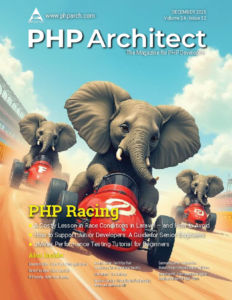Posts marked with “databases”
The PHP Podcast: 2025.03.06 Explaining Explain
This week on the PHP Podcast, Eric and John talk about Explain Explained, Postgres All The Things, Livewire Remote Code Execution, Lazy Object, and more… Links from the show: Understanding MySQL Queries with Explain I replaced my entire tech stack with Postgres… – YouTube RCE Via User-Crafted Requests · Advisory · livewire/volt · GitHub […]
PHP and Database Access
In its early days, the Internet was all about sharing static data like images, flat text files, and downloadable binaries. The early Internet’s static nature was useful in for sharing information. In many ways, the ability to tie static web pages to the dynamic content resident in enterprise databases allowed us to build new kinds of applications. This is where, in many respects, PHP shines.
Document databases, MySQL, JSON-Schema validation, and PHP types
In this Episode Eric, John, and Oscar discuss the August 2020 issue, Data Discipline. Topics Covered Using SQL with non-relational databases. Data integrity with UUIDs and primary keys. Connecting and working to databases directly. Rolling dice with PHP Thinking about data types. Using Windows or Linux as your daily driver.
PHP and Database Access
In its early days, the Internet was all about sharing static data like images, flat text files, and downloadable binaries. The early Internet’s static nature was useful in for sharing information. In many ways, the ability to tie static web pages to the dynamic content resident in enterprise databases allowed us to build new kinds […]
SQL Windowing Functions
Structured Query Language, or SQL, was a boring, ho-hum declarative programming language for many years until the fairly recent additions of common table expressions and windowing functions. CTEs and windowing functions turn SQL into a much more robust programming language which provides increased power for your SQL queries. Most popular databases have them and as […]
MySQL Generated Columns, Views, and Triggers
Databases often have neat features that go unnoticed or lightly used that could make your life as a developer much easier. This article started its path to print at the php[tek] 2018 conference with a discussion on generated columns in MySQL. Several attendees seemed to need extra guidance and this article is an attempt to […]
MySQL Without The SQL—Oh My!
Do you work on projects where you begin coding before knowing what your data looks like? Or are you part of the vast majority of developers who have had little or no training in database theory, relational calculus, Structured Query Language, or sets? Could you be working on a project without a database administrator to […]
AntidisestablishmentSQLism: an introduction to NoSQL
Talking about the NoSQL movement is like talking about a “NoC++” movement: people not using C++ have very little else in common with each other. For instance, some people say that NoSQL is obviously all about ACID (atomic, consistent, isolated, durable) vs. BASE (basically available, soft-state, easy). Other people say it’s all about scalability, whereas […]











